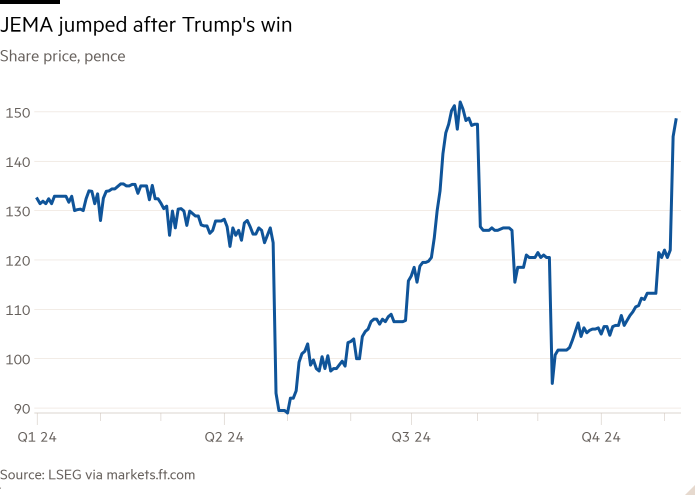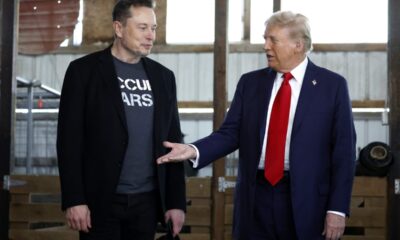Donald Trump will go down in history as a truly historic president. That is not a moral judgment. It is simply an acknowledgment of the scale of his achievement in completely remaking American politics.
Like Franklin Roosevelt or Ronald Reagan, Trump has not merely won re-election. He has also brought about fundamental shifts in policy, ideology and the political landscape. Unfortunately, he has also brought about a profound change in political norms, by embracing conspiracy theories and refusing to accept that he lost the 2020 presidential election.
The accusation that Trump is a threat to democracy turned out not to be the clinching argument that the Democrats imagined. That could be because Americans simply did not buy the argument. But there is also evidence that there is an appetite for strongman leadership in the US.
A Pew poll taken earlier this year showed that 32 per cent of Americans believe it would be a good idea to have a strong leader who can govern without being constrained by the courts or legislature. Another poll, taken last year, found 38 per cent of Americans and 48 per cent of Republicans thought the country needed a leader who is willing to “break some rules if that’s what it takes to set things right”.
The political instincts that told Trump many Americans might want a strongman leader also emboldened him to break with decades of Republican and Reaganite orthodoxy on a range of issues — from free trade to the defence of democracy around the world. Until Trump came on the scene, it was conventional wisdom that protectionism was an electoral liability — championed only by maverick losers such as Pat Buchanan. Trump, who says tariff is his favourite word, demonstrated that Americans were ready to embrace protectionist policies. The proof of his success in reversing decades of orthodoxy is that the Biden administration did not scrap Trump’s tariffs.
Trump has also broken with the neoconservatives who worshipped the memory of Reagan and championed the promotion of democracy around the world. After decades of war in Afghanistan and Iraq this, too, proved to be a shrewd political call. Academic research has shown that parts of the country where military casualties were higher than average were significantly more likely to back Trump.
During the Bush years, it was conventional wisdom that Republicans would lose Hispanic voters if they sounded too hostile to immigration. Trump has demonstrated that this is not true.
Trump’s ideology is, in some respects, Reaganism in reverse. Whereas Reagan argued for free trade and confrontation with the Soviet Union, Trump stands for protectionism and accommodation with Vladimir Putin’s Russia. Reagan’s sunny optimism about the US contrasts with Trump’s bleak pessimism about US decline. And whereas Reagan was correct and courteous in his manners; Trump is vulgar and threatening.
The one Reaganite policy that Trump has consistently championed is a commitment to low taxes and deregulation. Perhaps not coincidentally, this is the element of Reaganism that is most highly prized by the tech and finance grandees who fund political campaigns.
From his first declaration as a candidate in 2015, Trump defied the norms of political behaviour in ways that led to frequent erroneous predictions that his political career was doomed. He ridiculed and bullied fellow Republicans, mocked the disabled, made gross comments about women and attempted to overturn the result of a presidential election. But none of it was enough to finish him off. In fact, Trump’s taboo-smashing comments may have worked in his favour.
Over the past eight years, Trump has taken over the Grand Old Party — as the Republicans like to style themselves — and turned it into his personal instrument. Those Republicans who could not stomach his policies or his style — people such as Mitt Romney, Paul Ryan and Liz Cheney — have left politics or been marginalised. Other Republicans who once opposed him have apologised. JD Vance, who will be Trump’s vice-president, once tweeted, “Fellow Christians, everyone is watching us when we apologise for this man. Lord help us.” He has since apologised — not to the Lord but to Trump.
Trump’s victory over Kamala Harris will be taken as proof that his Maga agenda has been embraced not just by the Republican party but by the US as a whole. His followers are likely to demand rapid progress on the full slate of Maga policies — whether it is mass deportation of illegal immigrants, tax cuts or the purging of the “deep state”.
Yet while Trump’s political success is undeniable, it would be a mistake to over-interpret his mandate. There is currently a strong mood of anti-incumbency across the west as voters struggle with inflation, immigration and cultural change. That anti-incumbency mood has seen the Conservative party swept out of power in Britain, Emmanuel Macron lose his majority in France and now the collapse of the German government, This is also the third successive US presidential election in which the incumbent party has lost the vote.
Disillusioned American voters have now put their faith in a self-styled strongman leader. Over the next four years, they will discover whether Trump is the answer to their prayers — or a living nightmare.




































































































































































You must be logged in to post a comment Login